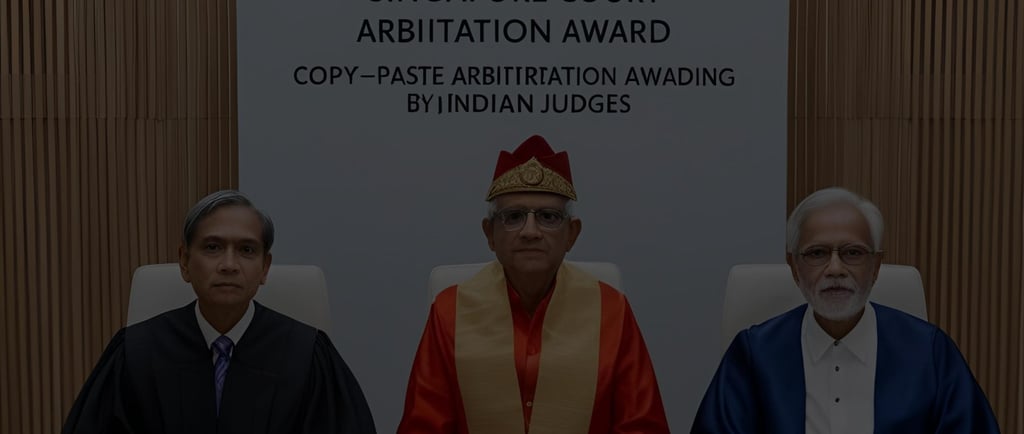Singapore Court Sets Aside Arbitration Award Over ‘Copy-Paste’ Reasoning by Retired Indian Judges
In a significant ruling, the Singapore International Commercial Court (SICC) has nullified an arbitral award delivered by a panel of retired Indian judges, citing a breach of natural justice and lack of independent adjudication. The case revolved around a construction dispute concerning the Dedicated Freight Corridor (DFC), a key infrastructure project in India.
5/18/20252 min read


The arbitral tribunal was chaired by former Chief Justice of India, Dipak Misra, and included Justices R. Banumathi and Krishn Kumar Lahoti. The majority decision was authored by the presiding judge and one co-arbitrator (referred to as Judges A and C), while Justice Banumathi dissented, finding the claim time-barred and lacking proper evidence.
The arbitration, seated in Singapore under the International Chamber of Commerce (ICC), involved a contractual dispute between a government-owned Indian entity and a consortium of construction companies. The core issue was whether a 2017 notification revising minimum wages qualified as a “change in law” under the terms of the contract, justifying an increase in contract price.
Copy-Paste Allegations and Plagiarism Concerns
The SICC found that the tribunal majority had failed to conduct a fresh, independent analysis and had instead recycled large portions of their reasoning from earlier arbitration awards, notably the CTP-13 Award. Judge Roger Giles, presiding over the matter, observed that 157 out of 176 substantive paragraphs in the CTP-11 award were either lifted verbatim or slightly modified from the earlier award, raising serious doubts about the tribunal’s impartiality and application of mind.
“The majority approached the arbitration with a closed mind,” Judge Giles stated, noting that a reasonable observer would suspect prejudgment and bias. The court highlighted that several legal authorities and contractual clauses referenced in the award were neither cited by the parties nor applicable to the actual contract (CTP-11).
Errors in Legal Application and Jurisdiction
One of the more egregious mistakes identified by the court was the tribunal’s reliance on provisions and annexures not present in the CTP-11 contract, but rather from the CTP-13 agreement. Additionally, the tribunal applied Indian law to determine interest and costs, even though Singapore law was meant to govern those aspects under the arbitration’s procedural framework.
Judge Giles emphasized that while arbitrators may serve on multiple related panels, they are duty-bound to evaluate each case independently. “Having the same tribunal in related arbitrations does not give the tribunal license to carry over to one arbitration… the tribunal must be scrupulous in deciding on the evidence and arguments in each.”
Claimant’s Rights and Due Process Violated
The court underscored that the claimant’s right to due process had been compromised, making the breach itself sufficient grounds for setting aside the award. It rejected arguments that the claimant should have raised objections during the arbitration, reaffirming that the integrity of the decision-making process is paramount.
In conclusion, the CTP-11 arbitral award was set aside, and the parties were directed to reach a mutual agreement on costs. If unresolved within 21 days, the court would intervene.
Legal Representation
The claimants were represented by senior counsel Koh Swee Yen SC and her team at WongPartnership LLP, supported by Sameer Jain and Anu Sura from PSL Advocates & Solicitors.
The defendants were represented by Davinder Singh SC of Davinder Singh Chambers LLC and his team, along with legal experts from Wong & Leow LLC.
